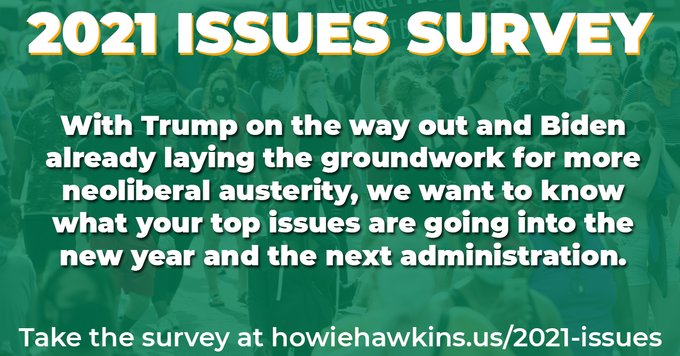What would your big issue be? The economy? Economic insecurity? Saving our planet via a Green New Deal? Covid? Wars?
I sometimes wonder why Cedric and I had kids. The way the world is today, I sometimes wonder.
I don't know that anyone is willing to stand up to Sleepy Joe. In fact, pay attention, people are calling out his nominees -- rightly calling them out -- are the ones being attacked by the centrists. How dare they try to pressure Joe -- that's their attitude.
This is C.I.'s "Iraq snapshot:"
Friday, November 27, 2020. Protesters attacked in Iraq, poverty increasing in Iraq and some US gas bag wants to wonder if a star chamber got ahold of president-elect Barack and forced Barack to do what he did?
We're noting the above for a reason. I don't know Michael Malice. Maybe he's new to the scene? If not, he needs to learn before he speaks.
Michael Malice is puzzled because, before he became president, Barack Obama voted against the Iraq War.
No.
You are wrong. You either don't know the truth or you're a damn liar and, at this late date, I'm not sure there is a significiant difference.
Barack Obama ran for the US Senate in 2004. He was the keynote speaker at that summer's DNC convention in Boston. He was not in the Senate (and he was never in the House of Representatives) when the Iraq War vote took place in 2002.
Grasp that. Get it through your head. Patricia J. Williams was especially fond of going on the radio and lying that Barack voted against the Iraq War -- only KPFA listeners ever offered her any on air pushback.
He, Michael Malice, is puzzled and wants to know since Barack was against the war then why did he continue it? Is there, Malice wonders, some star chamber that controls you, that comes to the new president and tells you 'this is how it's going to be'?
Do we really conspiracy theories? Apparently, they save a lot of time from doing the actual learning required.
We covered it here repeatedly. In the very intense 2008 Democratic fight between Barack and Hillary Clinton for the presidential nomination, Samantha Power called Hillary Clinton a "monster" and resigned. While the order in that sentence is correct, Samantha did not leave the campaign for that reason. Samantha was in England and just being a media darling, telling this and telling that. The "monster" comment wasn't a big deal -- whores like John Nichols worked overtime to invent a false friendship between Hillary and Samantha to minimize the attack. The problem was what was about to come out. Barack was campaigning on ending the Iraq War.
And Samantha told the BBC the truth -- that Barack's promise? Just words. He wouldn't be bound to anything he said in a campaign speech if he were elected president.
We covered it -- for days -- and THE WASHINGTON POST covered it and that was really about it.
A lot of Barack whores ignored. Take Tom Hayden. Tom ignored it. Then when he realized, months later, that Barack was going back on his promise, Tom suddenly shows up in July in a fit at HUFFINGTON POST screaming about what Samantha said back in March. Why didn't this get called out . . . by Hillary's campaign!!!!
He wouldn't take responsibility for his own silence but he would blame Hillary's campaign. Truth was, though, Hillary's campaign had called it out in real time. The only whoring was done by Barack's supporters.
Samantha's words were a danger for Barack in the midst of the primary and that's why she was forced out. Not because of "monster" but because if she remained with the campaign, the press would be asking about Barack's non-promise as detailed by his financial advisor Samantha Power. Her departure meant that the campaign could respond (and did), "Ms. Power is no longer with the campaign."
Barack was always lying. Back in 2007, he gave an interview where he explained that he might pull US troops out of Iraq only to send them back in. We noted this interview at length in the November 2, 2007 "Iraq snapshot," and at THIRD, we built "NYT: "Barack Obama Will Keep Troops In Iraq"" around it.
Barack was never about ending the war. Barack had said, as Bill Clinton rightly pointed out, that, had he been in the Senate, he probably would've voted for the 2002 measure.
I don't have time, 12 years later, to deal with some idiot's desperate need for a good daddy to lead him to offer conspiracy theories that exist to remove fault from Barack. Barack was not your friend. He was a hustler who lied to the people over and over. That you're so stupid and so desperate to believe in Barack's innocence that you'll invent some lunatic conspiracy to justify Barack's actions? You really are a sad, little man. Barack made clear what he would really do if he became president. And then he did it. So how about we deal with that? Hmmm? How about we deal with reality and address the damage that was done to the Iraqi people instead of offering fan boy jerk off material?
I'm just not in the mood.
The Iraqi government is in so much financial trouble that they are now attempting to get pre-payments as opposed to being paid for oil when it's delivered. This isn't 'pay ahead of shipping,' this is pay years in advance. Julia Payne and Ahmed Rasheed (REUTERS) explained, "The country is seeking a five-year prepayment starting January 2021 until December 2025 to be repaid with cargoes of its Basra crude, according to a letter sent by state oil marketer SOMO to its customers and seen by Reuters." ARGUS MEDIA notes:
Iraq has long been forced to juggle a heavy reliance on oil revenues to meet domestic funding requirements alongside pressure from the Opec+ alliance to comply with crude production quotas. But the strain has started to show ahead of next week's Opec and Opec+ ministerial meetings.
"We have reached the limit of our ability and willingness to accept a policy of one-size-fits-all," Iraq's finance minister and deputy prime minister Ali Allawi said at a Chatham House Iraq conference this week. "It has to be more nuanced and it has to be related to the per-capita income of people, the presence of sovereign wealth funds, none of which we have."
Under the current Opec+ agreement, Iraq was required to cut output by over 1mn b/d in May-July and by 849,000 b/d in August-December from an October 2018 baseline of 4.65mn b/d. Iraq produced an average 102,000 b/d above its quotas in May-October and now needs to produce 305,000 b/d below its November-December ceilings to compensate.
Iraq has long blamed the semi-autonomous Kurdish region in the north of the country for its failure to adhere to its Opec+ production ceiling, but Baghdad can only hide behind its dispute with the Kurdistan Regional Government (KRG) for so long. Iraq produced 3.85mn b/d in October, slightly above quota and 140,000 b/d higher than in September, Argus estimates show, but the month-on-month rise came mostly from federal fields, with KRG production largely stable at around 450,000 b/d.
Prime Minister Mustafa al-Kadhimi has failed to meet any of the social and political demands of the hundreds of thousands of Iraqis who took to the streets in October last year and forced the resignation of Adel Abdul Mahdi’s government.
His caretaker government, widely viewed as Iraq’s “last chance,” is now discredited and reviled.
The mass demonstrations were the result of growing anger among young people unable to find jobs, under conditions where 60 percent of the population is under 24 and most young people have no work. Over 90 percent of Iraqi jobs are casual, day-labour jobs in the informal sector, with just 10 percent providing regular employment, largely in the public sector and allocated on the basis of Iraq’s sectarian political system.
Repression of the initial protests—more than 560 demonstrators were killed and thousands injured as the government sought to disperse the crowds—led to their mushrooming into a generalised uprising against the conditions of poverty, the failure of essential social services and the endemic corruption in the sectarian-based regime ushered in by the US-UK military occupation after the criminal US-led invasion of 2003.
Successive Iraqi governments have presided over obscene levels of social inequality in a country that in 2009 was the world’s fifth-largest oil producer. Its immense wealth has been looted by the multinational oil corporations and banks as well as Iraq’s politically connected kleptocrats. In May, the UN predicted that poverty would rise to 40 percent of Iraq’s 39 million population because of the pandemic restrictions and falling oil prices. According to ReliefWeb, around 8 percent of households (3 million people) were not getting enough to eat in September.
Mustafa al-Kadhimi became prime minister on May 7th. He's done nothing. When it comes to the violence being carried out by his security forces, he is no longer just looking the other way, he's now rewarding these thugs who kill civilians. Doubt it? John Davison and Ahmed Rasheed (REUTERS) report:
The Iraqi military is training a former member of an Iran-backed militia, who is under U.S. sanctions for killing protesters, to become a high-ranking officer in the army, according to six government, security and militia officials.
They said that Hussein Falih Aziz, known as Abu Zainab al-Lami, had been sent to Egypt with Iraqi officers for a year-long training normally reserved for the country’s military personnel.
A defence ministry document seen by Reuters showed his name, with the rank Major General, on a list of officers attending the training until next summer.
He is a failure -- one in a long line of failures. An official who does nothing for the people. ANADOLU AGENCY notes:
Poverty in Iraq, which had amounted to 20% in 2018, or nearly 10 million people, has risen to 31.7% following the COVID-19 outbreak, Serife Akinci, an expert on Middle East and African Economies Studies, said in the report published by the Center for Middle Eastern Studies (ORSAM).
Iraq’s coronavirus count now stands at 12,086 deaths and 542,187 infections as well as 472,054 recoveries.
The attacks on protesters continue. Huda Mohammed Tweets:
Doctors Without Borders issued the following this week:
- Preparations have begun to remove internally-displaced Iraqis from Laylan displaced people’s camp in Kirkuk.
- Camp residents, who are being returned against their will, have expressed fears of being returned to areas that are unsafe.
- MSF urges the Iraqi authorities to reconsider their decision to close Laylan camp and to ensure that future returns are made in a voluntary and safe manner.
Amsterdam – Early yesterday morning, trucks arrived at Laylan displaced people’s camp, in Kirkuk governorate, Iraq,
in preparation for moving residents back to their areas of origin. Camp
residents have expressed their fears of being returned against their
will to staff from Médecins Sans Frontières (MSF). MSF, who is providing
healthcare in the camp, is deeply concerned about the humanitarian
consequences of such rushed camp closures on the already-vulnerable
displaced people without offering a safe and sustainable resolution.
Since October 2020, some 25,000 Iraqis living in formal camps for
displaced people have been returned to their areas of origin, as the
government of Iraq begins the process of camp closures. While for many
people returning home is a dream come true, for others the insecurity,
lack of shelter and absence of services that await them make camp
closures a nightmare.
“Even if they want to close the camp, they should not send us to our
home areas now,” one woman told MSF staff. “They need to provide safety
for us. Because of many tribal issues and insecurity, many people cannot
go back to their villages.”
They need to provide safety for us. Because of many tribal issues and insecurity, many people cannot go back to their villages.Displaced woman, Laylan IDP camp, Iraq
In some cases, returnees face possible violence and arrest in their areas of origin if they are suspected of affiliation with the Islamic State (IS) group. Stigma in Iraq against anyone suspected of links with the IS group means that some people are extremely fearful for their family’s safety.
“When some of my neighbours went back, they were verbally assaulted
and had to hide from local people – they were afraid they would be
hurt,” adds the woman.
More than 7,000 people currently live in Laylan camp, most of them women
and children. The camp was established in 2014 after conflict broke out
in several Iraqi towns, including Hawija and Salah Al-Din, forcing many
people to flee their homes. Several camp residents told MSF that they
have nothing to return to.
“Our house has been destroyed,” said one woman. “We have young children
and we don’t know how we’ll manage if we are sent back. The weather is
getting colder and colder each day. We have no salary to rent a house to
keep safe and warm.”
“Laylan camp is safe for us and we have water and electricity,” said the
woman. “If we are sent away, we’ll have no water or electricity. How
can we manage without these services in our daily life?”
Many residents also rely on the medical care they are receiving within
the camp, while access to healthcare for displaced people outside the
camp is limited.
“MSF is treating 300 patients with non-communicable diseases in the
camp; they require uninterrupted lifelong treatment and care,” says Gul
Badshah, MSF head of mission in Iraq. “With this rapid closure, there is
no time for MSF to provide patients with medication to cover a
three-month period until they manage to access another health facility
and to prepare the medical files they need to enrol in another NCD
programme in their area of return without interrupting their treatment.”
The COVID-19 pandemic is another concern for MSF teams.
“Our concern is that patients may have to move out of the camp in the
middle of the COVID-19 pandemic,” says Badshah. “There are eight
confirmed COVID-19 cases in the camp’s isolation area. It is not clear
how these patients would be transferred and how quickly they would get
access to medical care.”
MSF urges the Iraqi authorities to reconsider their decision to
imminently close Laylan camp and to ensure that future returns are made
in a more transparent, voluntary, safe and dignified manner.
We'll wind down with this from Ms. magazine:
 MORE THAN A MAGAZINE, A MOVEMENT |
|
   | |
Enjoy this newsletter? Forward to a friend! |
Ms. Magazine
1600 Wilson Boulevard
Suite 801
Arlington, VA 22209
United States
The following sites updated:




No comments:
Post a Comment